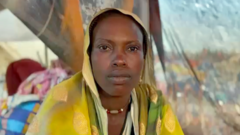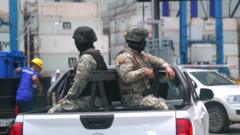With more than 54,000 displaced individuals and escalating conflicts, the situation on Colombia's northeastern border highlights the lasting implications of regional unrest and historical strife.
### Rebel Violence Escalates in Colombia Amid Tensions with Venezuela

### Rebel Violence Escalates in Colombia Amid Tensions with Venezuela
As a rebel group strengthens its roots in Venezuela, violence surges in Colombia, igniting fears of broader regional instability.
In northeastern Colombia, a remote area known for its lush landscapes and agricultural wealth, recent violence has escalated to alarming levels, showcasing a troubling resurgence of conflict in the region. Two opposing rebel factions are vying for control, leading to the displacement of over 54,000 residents and a humanitarian crisis marked by an estimated death toll of 80 individuals in just a few days.
The roots of this intense violence can be traced back to long-standing disputes over land and drug trafficking, exacerbated by failed peace accords that promised resolution but delivered little. Nevertheless, experts and authorities, including President Gustavo Petro, suggest that the situation has taken a new turn due to the evolving political climate in neighboring Venezuela.
The country has increasingly aligned itself with the National Liberation Army (ELN), a prominent player in the Colombian conflict that has found refuge and strength within Venezuelan borders. As Venezuela grapples with its own governance challenges and growing autocracy, its ties to the ELN have empowered the group in their territorial battles across the Colombian border.
In response to this violent resurgence, local communities, including farmers and families in the affected regions, are facing dire consequences. Schools are being repurposed as shelters for the displaced, and the social fabric of these communities is under significant strain as safety and basic human rights are compromised.
Despite attempts at diplomatic resolutions and the call for humanitarian aid, the precarious situation remains unresolved. As tensions persist between Colombia and Venezuela—rooted in historical conflicts and contemporary power struggles—there is concern from all sides about the potential for wider regional instability.
The ongoing violence not only showcases the fragility of peace in Colombia but also signals the need for renewed dialogue and intervention efforts to address the underlying issues fuelling this decades-long conflict, as well as the regional implications of Venezuela's political maneuvers.
The roots of this intense violence can be traced back to long-standing disputes over land and drug trafficking, exacerbated by failed peace accords that promised resolution but delivered little. Nevertheless, experts and authorities, including President Gustavo Petro, suggest that the situation has taken a new turn due to the evolving political climate in neighboring Venezuela.
The country has increasingly aligned itself with the National Liberation Army (ELN), a prominent player in the Colombian conflict that has found refuge and strength within Venezuelan borders. As Venezuela grapples with its own governance challenges and growing autocracy, its ties to the ELN have empowered the group in their territorial battles across the Colombian border.
In response to this violent resurgence, local communities, including farmers and families in the affected regions, are facing dire consequences. Schools are being repurposed as shelters for the displaced, and the social fabric of these communities is under significant strain as safety and basic human rights are compromised.
Despite attempts at diplomatic resolutions and the call for humanitarian aid, the precarious situation remains unresolved. As tensions persist between Colombia and Venezuela—rooted in historical conflicts and contemporary power struggles—there is concern from all sides about the potential for wider regional instability.
The ongoing violence not only showcases the fragility of peace in Colombia but also signals the need for renewed dialogue and intervention efforts to address the underlying issues fuelling this decades-long conflict, as well as the regional implications of Venezuela's political maneuvers.




















